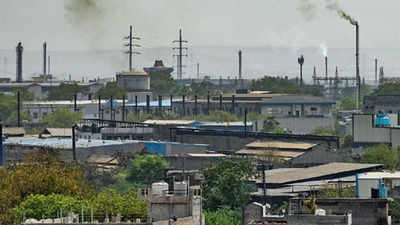- News
- City News
- gurgaon News
- Haryana industries to go green with Rs 564 crore clean energy push
Trending
Haryana industries to go green with Rs 564 crore clean energy push
The Haryana government has planned a Rs 564-crore initiative to help 1,000 industries switch to cleaner fuels over five years. Financial incentives up to Rs 20 lakh per unit will be provided to industries shifting to gas-based boilers and less polluting generators. Common boilers and tunnel-based technology for brick kilns will also be introduced.
GURGAON: The Haryana govt has come up with a Rs 564-crore plan to help industries across the state shift to cleaner fuels over the next five years.
Officials said on Sunday that the initiative, part of its Clean Air programme, will aim to transition 1,000 biomass-based boilers to gas. All industrial units that switch to new boilers, which run on piped natural gas (PNG), will get financial support of up to Rs 20 lakh per unit.
Govt has earmarked a budget of Rs 200 crore for this move. The second key plan is to help 2,400 industrial units shift to less polluting generator sets. Of these, 1,000 units will get incentives between Rs 5 lakh to Rs 20 lakh each, for adopting hybrid or dual-fuel generators. The remaining 1,400 units will get support to purchase new generator sets.
The budgetary allocation for this portion has been set at Rs 330 crore.
To support smaller industrial units, the state will set up two common boilers in the textile hubs of Sonipat and Panipat. Govt will provide capital subsidy of Rs 10-12 crore to Haryana State Industrial and Infrastructure Development Corporation (HSIIDC) to set these up, and will cover running costs up to Rs 3-5 crore for the first two years after installation. The total budget for this part of the initiative is Rs 30 crore.
"The common boiler will monitor and control particulate matter emissions from small industrial units, which currently rely on small boilers on their premises to heat up water or another suitable liquid through coal combustion to generate steam for purposes like water and central heating and power generation," Rao Narbir Singh, state minister for industries, commerce, and environment and wildlife, told TOI on Sunday.
Officials said that authorities can monitor emissions at small units after they install continuous emissions monitoring systems (CEMS) and air pollution control devices, but these aren't always economically feasible.
Instead, if the units rely on a common boiler, authorities can ensure adherence to emission norms with relative ease.
"Using a common boiler would also discourage small units from indiscriminately using boilers with capacities of less than two tonnes," the minister said. According to govt records, there are 576 boilers in the four NCR districts of Haryana -- 212 in Sonipat, 163 in Panipat, 132 in Faridabad, and 69 in Gurgaon. At least 53 of these are small boilers used in the textile hub of Panipat.
Separately, govt will urge brick kilns to shift to tunnel-based technology. The budget for this initiative is Rs 4 crore.
Brick kilns are allowed to operate only in non-NCR districts for four months in a year, starting March, according to norms. "Given their scattered nature and small-scale operations, monitoring these units poses a significant challenge," an official of the Haryana State Pollution Control Board (HSPCB) said.
According to the Central Pollution Control Board, the brick kiln industry's contribution to particulate matter (PM10) pollutants in Delhi-NCR during winter months is around 5%. In the summer, it is estimated to be around 7%.
Opposed to the traditional model, the tunnel kiln is constructed on-site and operates by transporting products on kiln cars through the furnace. It reduces the need for labour and energy, thereby cutting down on fuel requirement and carbon emissions too.
Officials said they have held discussions with industrial unit owners about the incentives and explained how the switch to cleaner fuel can be facilitated. Work under the programme will start in March and continue for five years. Industry associations said govt's initiative was a "significant" step.
"With financial support, this move will not only reduce carbon emissions but also enhance energy efficiency. We are committed to supporting this transition and ensuring a greener future for our industry. Several small industries had to shut down the work during winter because if found violating the norms, they had to pay Rs 1 crore or face jail term of up to 5 years. We are hopeful that things will improve with this move," said Parveen Singh, member of Sonipat Dyers' Association. Experts said the roadmap prepared by the govt was rational.
End of Article
FOLLOW US ON SOCIAL MEDIA
Visual Stories
Hot Picks
TOP TRENDING
Explore Every Corner
Across The Globe











